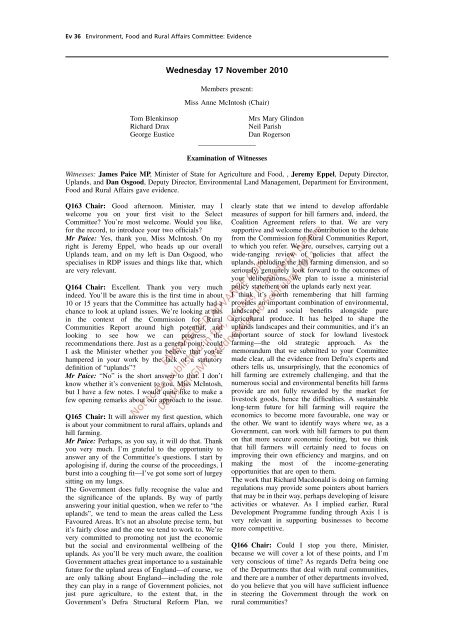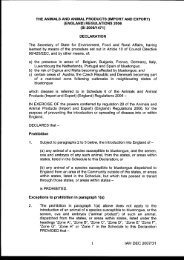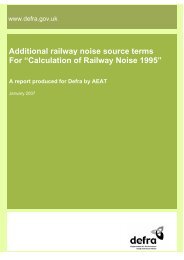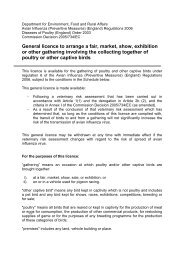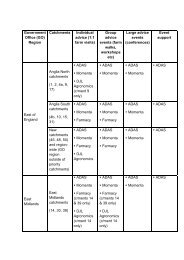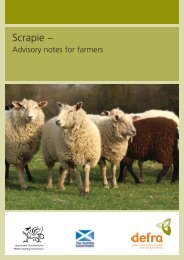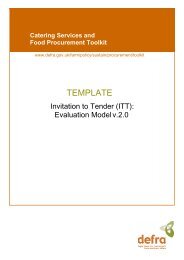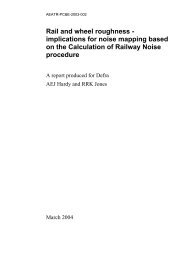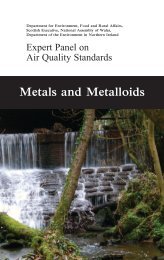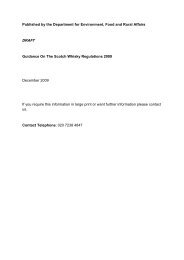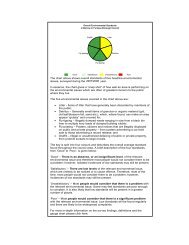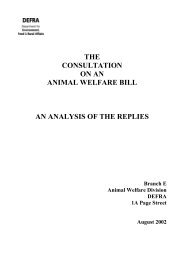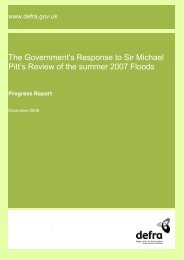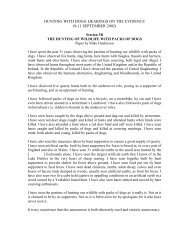Farming in the Uplands - ARCHIVE: Defra
Farming in the Uplands - ARCHIVE: Defra
Farming in the Uplands - ARCHIVE: Defra
Create successful ePaper yourself
Turn your PDF publications into a flip-book with our unique Google optimized e-Paper software.
Ev 36 Environment, Food and Rural Affairs Committee: Evidence<br />
Tom Blenk<strong>in</strong>sop<br />
Richard Drax<br />
George Eustice<br />
Wednesday 17 November 2010<br />
Members present:<br />
Miss Anne McIntosh (Chair)<br />
Mrs Mary Gl<strong>in</strong>don<br />
Neil Parish<br />
Dan Rogerson<br />
________________<br />
Exam<strong>in</strong>ation of Witnesses<br />
Witnesses: James Paice MP, M<strong>in</strong>ister of State for Agriculture and Food, , Jeremy Eppel, Deputy Director,<br />
<strong>Uplands</strong>, and Dan Osgood, Deputy Director, Environmental Land Management, Department for Environment,<br />
Food and Rural Affairs gave evidence.<br />
Q163 Chair: Good afternoon. M<strong>in</strong>ister, may I<br />
welcome you on your first visit to <strong>the</strong> Select<br />
Committee? You’re most welcome. Would you like,<br />
for <strong>the</strong> record, to <strong>in</strong>troduce your two officials?<br />
Mr Paice: Yes, thank you, Miss McIntosh. On my<br />
right is Jeremy Eppel, who heads up our overall<br />
<strong>Uplands</strong> team, and on my left is Dan Osgood, who<br />
specialises <strong>in</strong> RDP issues and th<strong>in</strong>gs like that, which<br />
are very relevant.<br />
Q164 Chair: Excellent. Thank you very much<br />
<strong>in</strong>deed. You’ll be aware this is <strong>the</strong> first time <strong>in</strong> about<br />
10 or 15 years that <strong>the</strong> Committee has actually had a<br />
chance to look at upland issues. We’re look<strong>in</strong>g at this<br />
<strong>in</strong> <strong>the</strong> context of <strong>the</strong> Commission for Rural<br />
Communities Report around high potential, and<br />
look<strong>in</strong>g to see how we can progress <strong>the</strong><br />
recommendations <strong>the</strong>re. Just as a general po<strong>in</strong>t, could<br />
I ask <strong>the</strong> M<strong>in</strong>ister whe<strong>the</strong>r you believe that you’re<br />
hampered <strong>in</strong> your work by <strong>the</strong> lack of a statutory<br />
def<strong>in</strong>ition of “uplands”?<br />
Mr Paice: “No” is <strong>the</strong> short answer to that. I don’t<br />
know whe<strong>the</strong>r it’s convenient to you, Miss McIntosh,<br />
but I have a few notes. I would quite like to make a<br />
few open<strong>in</strong>g remarks about our approach to <strong>the</strong> issue.<br />
Q165 Chair: It will answer my first question, which<br />
is about your commitment to rural affairs, uplands and<br />
hill farm<strong>in</strong>g.<br />
Mr Paice: Perhaps, as you say, it will do that. Thank<br />
you very much. I’m grateful to <strong>the</strong> opportunity to<br />
answer any of <strong>the</strong> Committee’s questions. I start by<br />
apologis<strong>in</strong>g if, dur<strong>in</strong>g <strong>the</strong> course of <strong>the</strong> proceed<strong>in</strong>gs, I<br />
burst <strong>in</strong>to a cough<strong>in</strong>g fit—I’ve got some sort of lurgey<br />
sitt<strong>in</strong>g on my lungs.<br />
The Government does fully recognise <strong>the</strong> value and<br />
<strong>the</strong> significance of <strong>the</strong> uplands. By way of partly<br />
answer<strong>in</strong>g your <strong>in</strong>itial question, when we refer to “<strong>the</strong><br />
uplands”, we tend to mean <strong>the</strong> areas called <strong>the</strong> Less<br />
Favoured Areas. It’s not an absolute precise term, but<br />
it’s fairly close and <strong>the</strong> one we tend to work to. We’re<br />
very committed to promot<strong>in</strong>g not just <strong>the</strong> economic<br />
but <strong>the</strong> social and environmental wellbe<strong>in</strong>g of <strong>the</strong><br />
uplands. As you’ll be very much aware, <strong>the</strong> coalition<br />
Government attaches great importance to a susta<strong>in</strong>able<br />
future for <strong>the</strong> upland areas of England—of course, we<br />
are only talk<strong>in</strong>g about England—<strong>in</strong>clud<strong>in</strong>g <strong>the</strong> role<br />
<strong>the</strong>y can play <strong>in</strong> a range of Government policies, not<br />
just pure agriculture, to <strong>the</strong> extent that, <strong>in</strong> <strong>the</strong><br />
Government’s <strong>Defra</strong> Structural Reform Plan, we<br />
clearly state that we <strong>in</strong>tend to develop affordable<br />
measures of support for hill farmers and, <strong>in</strong>deed, <strong>the</strong><br />
Coalition Agreement refers to that. We are very<br />
supportive and welcome <strong>the</strong> contribution to <strong>the</strong> debate<br />
from <strong>the</strong> Commission for Rural Communities Report,<br />
to which you refer. We are, ourselves, carry<strong>in</strong>g out a<br />
wide-rang<strong>in</strong>g review of policies that affect <strong>the</strong><br />
uplands, <strong>in</strong>clud<strong>in</strong>g <strong>the</strong> hill farm<strong>in</strong>g dimension, and so<br />
seriously, genu<strong>in</strong>ely look forward to <strong>the</strong> outcomes of<br />
your deliberations. We plan to issue a m<strong>in</strong>isterial<br />
policy statement on <strong>the</strong> uplands early next year.<br />
I th<strong>in</strong>k it’s worth remember<strong>in</strong>g that hill farm<strong>in</strong>g<br />
provides an important comb<strong>in</strong>ation of environmental,<br />
landscape and social benefits alongside pure<br />
agricultural produce. It has helped to shape <strong>the</strong><br />
uplands landscapes and <strong>the</strong>ir communities, and it’s an<br />
important source of stock for lowland livestock<br />
farm<strong>in</strong>g—<strong>the</strong> old strategic approach. As <strong>the</strong><br />
memorandum that we submitted to your Committee<br />
made clear, all <strong>the</strong> evidence from <strong>Defra</strong>’s experts and<br />
o<strong>the</strong>rs tells us, unsurpris<strong>in</strong>gly, that <strong>the</strong> economics of<br />
hill farm<strong>in</strong>g are extremely challeng<strong>in</strong>g, and that <strong>the</strong><br />
numerous social and environmental benefits hill farms<br />
provide are not fully rewarded by <strong>the</strong> market for<br />
livestock goods, hence <strong>the</strong> difficulties. A susta<strong>in</strong>able<br />
long-term future for hill farm<strong>in</strong>g will require <strong>the</strong><br />
economics to become more favourable, one way or<br />
<strong>the</strong> o<strong>the</strong>r. We want to identify ways where we, as a<br />
Government, can work with hill farmers to put <strong>the</strong>m<br />
on that more secure economic foot<strong>in</strong>g, but we th<strong>in</strong>k<br />
that hill farmers will certa<strong>in</strong>ly need to focus on<br />
improv<strong>in</strong>g <strong>the</strong>ir own efficiency and marg<strong>in</strong>s, and on<br />
mak<strong>in</strong>g <strong>the</strong> most of <strong>the</strong> <strong>in</strong>come-generat<strong>in</strong>g<br />
opportunities that are open to <strong>the</strong>m.<br />
The work that Richard Macdonald is do<strong>in</strong>g on farm<strong>in</strong>g<br />
regulations may provide some po<strong>in</strong>ters about barriers<br />
that may be <strong>in</strong> <strong>the</strong>ir way, perhaps develop<strong>in</strong>g of leisure<br />
activities or whatever. As I implied earlier, Rural<br />
Development Programme fund<strong>in</strong>g through Axis 1 is<br />
very relevant <strong>in</strong> support<strong>in</strong>g bus<strong>in</strong>esses to become<br />
more competitive.<br />
EMBARGOED ADVANCE COPY:<br />
Not to be published <strong>in</strong> full, or part, <strong>in</strong> any form before<br />
00.01am GMT Wednesday 16 February 2011<br />
Q166 Chair: Could I stop you <strong>the</strong>re, M<strong>in</strong>ister,<br />
because we will cover a lot of <strong>the</strong>se po<strong>in</strong>ts, and I’m<br />
very conscious of time? As regards <strong>Defra</strong> be<strong>in</strong>g one<br />
of <strong>the</strong> Departments that deal with rural communities,<br />
and <strong>the</strong>re are a number of o<strong>the</strong>r departments <strong>in</strong>volved,<br />
do you believe that you will have sufficient <strong>in</strong>fluence<br />
<strong>in</strong> steer<strong>in</strong>g <strong>the</strong> Government through <strong>the</strong> work on<br />
rural communities?


